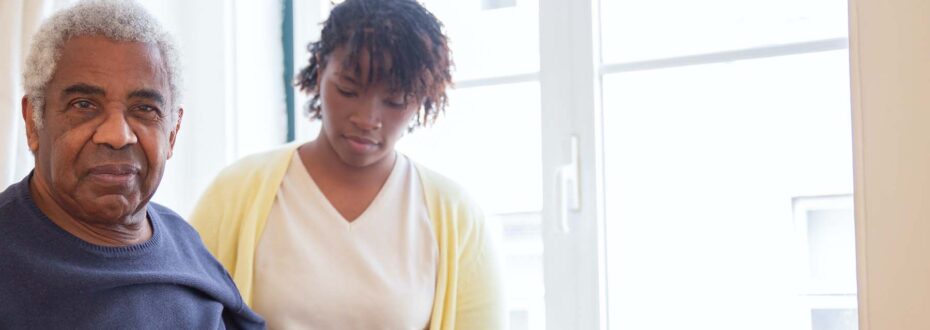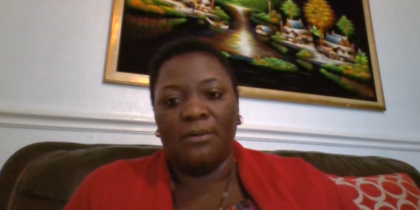By Iola Nkau
According to the NHS, someone is a young carer if they are “under 18 and help to look after a relative with a disability, illness, mental health condition, or drug or alcohol problem.” Data from the last census suggests that there are roughly 166,000 young carers aged 5-17 in England, but The Children’s Society thinks the realistic figure lies closer to 800,000. There are many reasons why young people don’t identify as young carers, whether because they don’t even know there’s a term to describe their day-to-day experiences, or due to stigma around the term and the illness of the person they care for.
I care for my dad who has multiple mental health difficulties. Most of my time caring is spent providing emotional support. For years it was easy to invalidate myself and the support I was providing, saying things like, “I’m not doing much to physically help him, so I’m not a carer.” Navigating my own misconceptions and self-doubt was difficult, and I also minimised the toll things were taking on my own mental health. It was easy for me to make my own struggles seem insignificant because I was so focused on my dad and his mental health, that I felt I was being melodramatic and shouldn’t talk about it, for fear of invalidating his experiences.
getting help hasn’t always been easy, as many of the professionals I have spoken to don’t fully… see the impact that my cultural upbringing has on how I view my role within the family unit
Now I know this isn’t the case and that my struggles were and still are valid. I needed support, like many other young carers do. Research from the Carers Trust has found that 38% of young carers report having a mental health condition. It is acknowledged that it is highly likely for young carers to experience mental health problems, yet there is little support for us. If we have identified a trend, we should be working to fix it before the problem has arisen and developed further.
As a student in sixth form, I balance my schoolwork and supporting my dad – an experience familiar to many young carers. Finding the time to look after myself and my mental wellbeing in particular has been difficult. I feel it is my responsibility to focus on my dad and let my own troubles be pushed to the side at times, worrying that my sadness will make him feel worse. It has been difficult focusing on myself without feeling selfish, and finding the balance has been challenging, but is by far the best thing I have done for myself. But getting help hasn’t always been easy, as many of the professionals I have spoken to don’t fully understand my role as a young carer, or see the impact that my cultural upbringing has on how I view my role within the family unit.
Similarly to my culture… it is expected that younger people will look after family members. This is then further compounded by the lack of trust in health and social care systems. Why would we trust the same systems to help us that actively discriminate against us?
As I am mixed race, I have grown up in a household with a blend of cultures. It is a cultural expectation to look after your family, especially your parents. This can sometimes conflict with advice I am given to step away from my responsibilities, as that’s not necessarily how I have been brought up to think. It also made accepting that I am a carer difficult as I saw what I was doing as part of my role as a daughter. I thought I was just being helpful. The National Black Carers and Carers Workers Network found that they couldn’t find a near translation for ‘carer’ in Gujarati, Urdu, Punjabi, and Bengali. Similarly to my culture, this could be because in some South Asian cultures it is expected that younger people will look after family members. This is then further compounded by the lack of trust in health and social care systems. Why would we trust the same systems to help us that actively discriminate against us?
The Barnardo’s Caring Alone 2019 report found that ‘many young carers struggled to get the support they needed to live a normal childhood,’ but that for young carers from racialised communities, it was more likely that they wouldn’t receive “support both financially and practically, often as a result of the difficulty in accessing culturally appropriate information and a lack of engagement with these communities.”
Services need to listen to the experiences of young carers from racialised communities, and give us the space to explain and not be spoken over.
Through my local Carers Centre, I had the opportunity to be a part of a project where the NHS shared top tips for general practitioners on supporting young carers. These tips that we developed together as young carers focused on the importance of understanding that everyone’s situation is different and the importance of listening to the young person. While this will be beneficial to many young carers, we need the perspective of more young carers from racialised communities, so services can be better equipped to help us. This plan is estimated to benefit only 20,000 of the roughly 800,000 young carers in England. I fear that the carers missing out from these benefits will be the ones from marginalised, low income and racialised communities.
We need to actively work and engage with racialised communities more to help reduce stigma around disabilities, mental illness and caring. Services need to listen to the experiences of young carers from racialised communities, and give us the space to explain and not be spoken over. We are too used to being spoken over in other aspects of our lives, and we won’t engage unless services are willing to listen without imposing their ideas on us, communicating with openness, clarity and cultural sensitivity.








